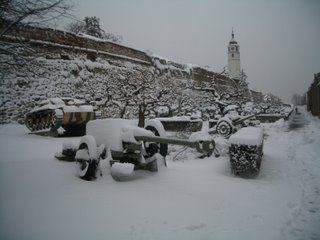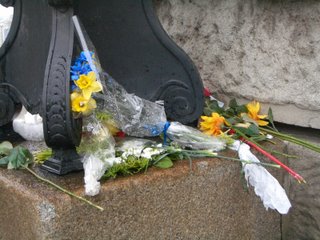B92 and the death of Milosevic
 A thick blanket of snow fell on Belgrade on Monday, March 13, following the death of former President, Slobodan Milosevic two days earlier. When I arrived on the Sunday at lunchtime, people in Belgrade appeared to be going about life as normal. It was cold and wet with few venturing out on the street.
A thick blanket of snow fell on Belgrade on Monday, March 13, following the death of former President, Slobodan Milosevic two days earlier. When I arrived on the Sunday at lunchtime, people in Belgrade appeared to be going about life as normal. It was cold and wet with few venturing out on the street.International TV crews gathered outside the parliament. Some delivered the news in tones that matched the atmosphere, others seemed more excited. What was clear was that talking to local journalists offered a far more accurate assessment of what was really happening than listening to some of the international anchors in front of the cameras.
Considering Milosevic used to draw crowds in their hundreds of thousands, it was interesting to see that only a few thousand turning out to lay flowers. Most were middle aged or older. All seemed genuinely distressed. The young appeared to want to move on. One young journalist friend of mine told me that he felt it was important people try to understand the grief of the old and poor Milosevic supporters in order to help the country achieve closure.
 B92 went into rolling news for eight hours on the Saturday. It was an excellent effort considering the resources available. There was also some sensitive balance with the announcement of the death of Milosevic coming on the third anniversary of the assassination of former Serbian Prime Minister, Zoran Djindjic. B92 had to cover both stories, and they did so with solid editorial professionalism.
B92 went into rolling news for eight hours on the Saturday. It was an excellent effort considering the resources available. There was also some sensitive balance with the announcement of the death of Milosevic coming on the third anniversary of the assassination of former Serbian Prime Minister, Zoran Djindjic. B92 had to cover both stories, and they did so with solid editorial professionalism.On the day the body returned to Belgrade the B92 evening bulletin devoted half the programme to the event. A B92 crew came under verbal attack from Milosevic supporters during the making of one of the news packages, but nobody was seriously hurt.
I left Belgrade the eve of the funeral and return in eight days.
Client: B92
Media Development Organisation: The BBC World Service Trust

<< Home